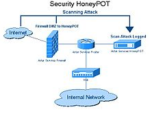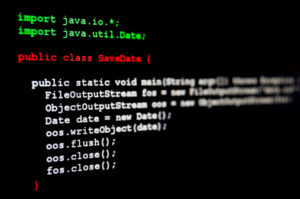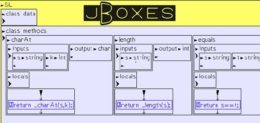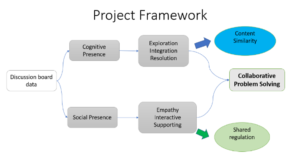Request Information
Ready to find out what MSU Denver can do for you? We’ve got you covered.
Dr. Beaty has several research projects. There is work on any of these for undergraduates. It’s also possible to present at https://www.msudenver.edu/undergraduate-research-creative-scholarship-program/undergraduate-research-conference/.

 This DNS server does a lot including MDNS, TLS, and DOH. Some work that needs to be done includes the following:
This DNS server does a lot including MDNS, TLS, and DOH. Some work that needs to be done includes the following:

Please email [email protected] if you are interested in any of these.
For interested MSU students there are a few projects available to work on. There may be funding available to work on these, depending on the semester, but there is always the opportunity to extend these into a research project that can be published in The Rowdy Scholar or presented at the Undergraduate Research Conference. Most of these projects revolve around Computer Science education or improving education with technology (yes, getting students into the computer science pipeline is another issue, but one which I haven’t delved into yet).
This project is broad in scope and involves analyzing data and developing/implementing tools to help students to learn more effectively in core CS courses using Continuous Assessments (e.g. weekly quizzes) and Peer Instruction (e.g. in-class tasks/assignments completed by pairs or small groups of students working together). Given the broad scope, it’s possible to focus entirely on just one of the following.
This project is about applying deep learning models to textual and sequential data with one a specific use-case of analyzing open-ended responses to surveys/quizzes. However, the possible applications of NLP are vast so if you are interested in applying NLP to another domain that is a possibility as well. For example, one other project in this area is to utilize an existing large language model (e.g. BERT) and fine-tune it to be used as a ‘Course Assistant’ in a CS course. This may include aspects of the third task above (e.g. implementing an MS Teams chatbot).
Although not an explicit project, if you are interested in competing in Kaggle competitions, or have some other Data Science or Machine Learning task that you would like to tackle but need some additional help, then feel free to reach out for consulting and possible mentorship.
Please email [email protected] if you are interested in any of these or for more information.
Dr. Jiang has been working on research projects on Computer Vision. Machine Learning. AI Tools for Education and Intelligent Agriculture.
Students who are interested in these areas can email [email protected] to schedule a meeting/interview.
Dr. Mota research interests are in the areas of data mining, database systems, programming languages, and cloud computing. Below are some projects that he is currently working on and that can involve motivated students who are interested in engaging in research activities.
Exploring Anti-Asian Racism on Twitter
Which types of threat perceptions appear in the racism-infused tweets against Asians reveal in the unique context of the COVID-19 pandemic? What drives harmful tweets to go viral? These are some of the questions that this research project aims to answer.
Skills: API, NoSQL databases, Python, NLP (Natural Language Processing), and statistics.
A Framework for Collaborative Recommendation Systems
Collaborative recommendation systems try to suggest products or services based on the degree of similarity between users. The goal of this project is to develop a framework that can be easily adapted to different recommendation systems based on databases available on the internet, such as Goodreads, Yelp, Tripadvisor, IMDb, among others.
Skills: API, web scraping, graph databases, Python, ranking algorithms, and statistics.
Data Mining Pipeline Architectures
When it comes to building data mining pipelines, there are many options available, from simple pipelines with small datasets that can fit in memory to more complex pipelines with real-time generated data simultaneously analyzed by different processes using cloud computing tools. Students working on this project will have the opportunity to study different data mining pipeline architectures using cutting-edge tools and techniques to solve real-world problems.
Skills: cloud computing, data mining, databases, programming languages.
Please email [email protected] if you are interested in any of these or for more information.

Cultivating Inclusive Professional Identities in Engineering and Computer Science
https://partnership4equity.org
The P4E:STEM project seeks to cultivate inclusive professional identities in engineering and computer science students through curricular design and implementation. Inclusive professional identities prepare students to be aware, skillful, and mindful when engaging in endeavors associated with their chosen disciplines.
Key characteristics of inclusive professional identities addressed by P4E:
In this project, diversity and inclusivity are contextualized by the engineering and computer science academic disciplines and those undertakings and professions that draw upon students’ educational experiences in the disciplines.
The P4E:STEM project adopts a broad definition of diversity that encompasses a wide span of demographic characteristics, with emphasis on those commonly associated with underrepresentation, marginalization, and discrimination.
Experimentation with geopolitical redistricting by computer
https://metrocs.github.io/redistricting/
The Redistricting project provides a library that supports investigations of splitting a geographic region into election districts and the development of tools that:
• Educate the public on the process of redistricting;
• Demonstrate redistricting by automating the process based on given parameters reflecting a desired outcome;
• Demonstrate how redistricting can be used to establish an advantage for a political party or group (Gerrymandering); and
• Facilitate incrementally adding functionality to redistricting modeling capability.
The initial scope is a Java package that provides utilities for building programs that investigate redistricting scenarios.
The expanded scope includes a user interface for redistricting scenario exploration.
Stakeholder identification:
• Users (public, students, programmers [novice & experienced])
• Educators (instructors, mentors, tutors)
• Maintainers (project developers, maintainers, quality engineers)
A framework and application for beginning programmers to develop and experiment with image modification
https://metrocs.github.io/imagelab/
ImageLab is a framework and application that allows students to develop image modification processors (filters) and to experience the results visually and musically.
The ImageLab product is intended for use in beginning programming courses (such as CS1050 at MSU Denver).
The interactive ImageLab application is provided as Java source code as well as an executable JAR file.

Affording access by beginning programmers to quality-assessment tools
https://github.com/MetroCS/QualityToolsForBlueJ
This effort provides an extension to BlueJ (an IDE for students learning how to write programs) that affords access to quality assessment tools.
The initial deliverable encapsulated Checkstyle to validate adherence to coding conventions.
The project continues to update and expand the set of source code analysis tools.

An interactive foundation for explorations about programming in Java and other computer science concepts
https://metrocs.github.io/jBoxes/
The main goal of the jBoxes software is to provide learners with a semantic model for a Java-like language—a detailed, concrete conceptual picture of how the computer behaves when it performs the instructions given to it in a program.
jBoxes is the brainchild of Dr. Gerald Shultz, Professor Emeritus at MSU Denver. It has been transformed into an open source software project under the purview of MetroCS.
The project includes the interactive jBoxes application (C++) along with an associated book and reference guide.
Please email [email protected] if you are interested in any of these or for more information.
Introduction and Research Vision
As an interdisciplinary researcher, my research vision is to bridge the gap between technology and humanity, focusing on the domains of Human-Computer Interaction (HCI), Human-Robot Interaction (HRI), Machine Learning (ML) and Augmented / Virtual Reality (AR / VR). I am deeply committed to creating technologies that are not only innovative, but ethical, accessible, universally usable, and beneficial to society at large.
My research is centered around several interconnected areas with the overarching goal of empowering people through better technology: the design and perception of robots, the application of machine learning in various contexts, the use of AR/VR in education and design, the use of robotics and mobile applications in providing companionship and psychoeducational resources, and the development of sustainable regional systems. Although these areas seem distinct, they share a common thread: they all involve the intersection of people and technology and aim to improve human lives. In my scholarship, I strive to ensure that we create technologies that are effective, understandable, and relevant to the people who use them. This is particularly evident in my work on the Sustainability Hub project, which helps to create a central location for sustainability data in Colorado. My scholarship also reflects my deep commitment to the principles of diversity, equity, and inclusion. I believe that technology has the potential to be a great equalizer, but only if we make a concerted effort to ensure that it is accessible, universally usable, and beneficial to all.
Colorado Sustainability Hub: Building Capacity for Convergence
I am honored to lead the Sustainability Hub project, a transformative initiative funded by the National Science Foundation (NSF) under award number 2318730. This project aims to consolidate sustainability and well-being data from across Colorado into a single universally accessible platform. It represents a significant milestone for the MSU Denver Computer Sciences Department, underscoring our commitment to fostering undergraduate research and providing our students with opportunities to contribute to meaningful, real-world projects.
The Sustainability Hub project is an interdisciplinary initiative that addresses the pressures, responses, and intersections of sustainability in a growing, innovative, and dry-weather state. We aim to provide better ways for local communities, municipal agencies, practitioners, researchers, educators, and students to engage and collaborate with one another in co-defining regional research agendas, coproducing knowledge, and wisdom, and accessing knowledge, resources, data, and tools. By creating a Community Data Hub, we are working to increase data democracy as it relates to regional systems and sustainability, allowing greater diversity and inclusivity in all aspects of research, development, and decision-making. The project also aims to involve underrepresented groups in the project and to encourage students to participate in research and technical conferences.
The project is a collaborative effort that involved several institutions, and I serve as the Principal Investigator (PI) at MSU. Other participating institutions include the University of Denver, the University of Northern Colorado, Colorado State University, and Colorado State University Pueblo. The project will foster collaboration among community members, policy makers and researchers, empowering users of various backgrounds to engage with and draw conclusions from the data.
Innovating Human-Robot Interaction: Build-A-Bot
The Build-A-Bot project, a collaboration with the University of Denver, is a pioneering initiative in the domain of Human-Computer Interaction (HCI) and Human-Robot Interaction (HRI). The project focuses on exploring mind perception in robots and aims to create robots that are perceived by users as having a ‘mind’ or consciousness. This is achieved through a novel robot design research platform implemented as a 3D game accessible through the Web, which allows for the collection of user-provided robot design examples. These examples are used to train Machine Learning (ML) models to evaluate robot designs, predict how a design will be perceived, and create new robot designs. The project also incorporates neuroscientific measures to independently assess the ML models created. My main research focus for this project is in helping develop the Build-A-Bot platform and its associated website and to supervise the training of the ML models from the data it generates.
The project has resulted in several significant publications, as detailed in my portfolio. One of our first key publications on the topic was “A Novel Online Robot Design Research Platform to Determine Robot Mind Perception”, presented at the ACM/IEEE International Conference on Human-Robot Interaction (HRI). I am particularly proud of this result, as it was a chance for our undergraduate researchers to work on a publication detailing their valuable research on the project.
Empowering Adolescents through Technology: DiscoverU
DiscoverU is an innovative project that aims to address the pressing issue of mental health among adolescents. The project focuses on developing a mobile application that provides psychoeducational resources evaluated by subject matter experts. This is a significant departure from the plethora of mental health resources available on the Internet, many of which are not peer reviewed and may not be reliable or effective.
The DiscoverU application is designed to serve two target audiences: teens and their parents, a segment of the population that has historically been underserved in terms of mental health resources. The application is being developed in collaboration with the Graduate School of Professional Psychology and the Ritchie School of Computer Science & Engineering at the University of Denver. The application interface is designed with a Colorado theme, incorporating calming mountain and nature design elements to support the mental health focus of the app.
One of the unique aspects of the DiscoverU project is the gamification of the learning experience. This approach is intended to keep users engaged and make the learning process about mental health more enjoyable and less daunting. The application’s content is also being tailored to its respective audiences to ensure the most effective resources are provided. The goal of DiscoverU is to give youth the tools to manage their mental health and act as a comprehensive resource that provides care across a spectrum, from prevention and education to service delivery.
Advancements in Robotics and Augmented/Virtual Reality
My research in robotics and augmented/virtual reality (AR/VR) focuses on user-centered design, improving user experience, and improving results across various domains. The study on “Robot-Administered Serious Brain Games for Older Adults with Mild Cognitive Impairment or early-stage Alzheimer’s Disease” explores the potential of robots in cognitive training for older adults, showing promising results in improved cognitive function and user participation. In logistics, the project “Building Trust with a Mobile Application for Last-Mile Commercial Drone Delivery” underscores the importance of transparency and user control to build trust in autonomous systems. In education, my work on “Secure Virtual Reality Classrooms” and “Development and Evaluation of Virtual Reality Classrooms During COVID-19” highlights the potential of VR to improve learning experiences and emphasizes the importance of user privacy and security, leading to ongoing work on adding authentication and authorization mechanisms to VR classrooms. Finally, the project “Exploring Augmented Reality Robot Design” suggests that designing robots in an AR environment could lead to stronger mental models of these robots, potentially improving human-robot interactions.
Please email [email protected] if you are interested in any of these.
Learning Analytics and Educational Data Mining
The learning analytics pilots: Identifying and exploring actionable sources of data and building computational tools with analytics to address identified problems at micro (individual), meso (departmental) and macro (institutional) level.
Current Project: Teaching with Analytics – Visualizing Discussion Board
Building a visualization tool for discussion boards in Canvas to improve the student feedback system using text analytics, NLP and data visualization.

1. Building a basic text analytics models for content similarity from unstructured data.
2. Building a basic text analytics models for self and shared regulation from unstructured data.
Please email [email protected] if you are interested in any of these or for more information.